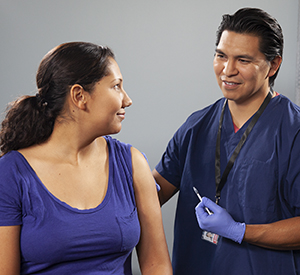If You Are Rh Negative
If you are pregnant and your blood is Rh negative, you need to be treated with medicine. You need this treatment even if you miscarry or don’t deliver the baby. This is to protect the health of any baby you have in the future.
What is the treatment?
The treatment is a shot of medicine. The medicine is called Rho(D) immune globulin. This stops Rh antibodies from forming. The shot won’t harm you or your baby.
When are you treated?
If your blood has not made Rh antibodies, you’ll be given the medicine at these times:
-
During week 28 of your pregnancy
-
Any time there’s a chance that your baby's blood has mixed with yours (such as due to a miscarriage or an ectopic pregnancy)
-
If you have a prenatal test called amniocentesis
-
If you have vaginal bleeding before 28 weeks
 |
| A Rho(D) immune globulin injection protects against Rh disease in this and future pregnancies. |
After you give birth
After you give birth, your baby’s blood will be tested. If their blood is Rh positive, you’ll be given the medicine again in 3 days. If their blood is Rh negative, you won’t need the medicine until your next pregnancy.
If you already have Rh antibodies
If your blood has antibodies, this is called Rh sensitization. Rho(D) immune globulin can’t protect the baby. You and your baby will need special care during pregnancy. This may include extra tests. Your healthcare provider will tell you what to expect.
Preventing future problems
Your risk of making Rh antibodies rises with each pregnancy. This is true even if you don’t deliver a baby. Your body can make Rh antibodies even if you don’t give birth. This includes if you have an ectopic pregnancy. This is when the fertilized egg is outside the uterus. It's true for a pregnancy that ends in miscarriage or abortion. You will still need the Rho(D) immune globulin medicine. This is to prevent problems in any future pregnancy.